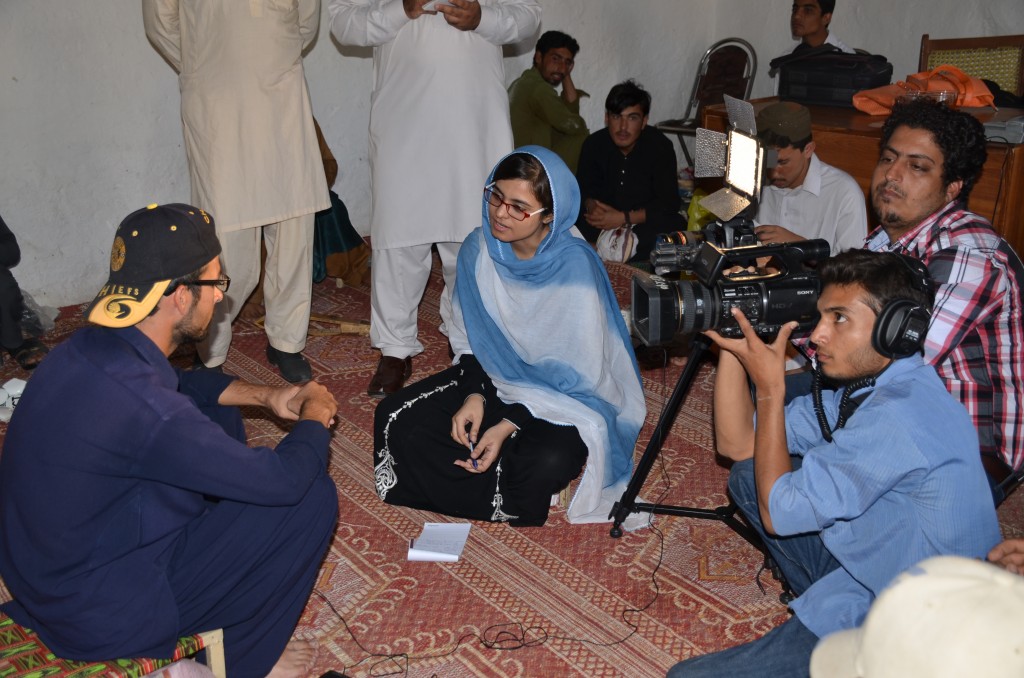Arooj Zahra
Daniel Pearl Fellow
Lahore, Pakistan
GEO News
Host: The Washington Post
Broadcaster believes her stories can help bring positive change in society
For Arooj Zahra, fear is not an option. Decades of violent extremism and armies of religious fanatics did not stop the young journalist from chasing stories in Pakistan’s dangerous places. Neither did the killing of colleagues, including one journalist she knows who died trying to find out where the Taliban was keeping prisoners.
Zahra, who also produces documentary films, is committed to telling important stories about sensitive issues such as religious extremism and abuse directed toward discriminated groups including Shias, Christians and Hindus.
Zahra pitched a story on interfaith harmony right after the assassination of Salmaan Taseer, the governor of Punjab. Taseer was shot dead by his own security guard because he stood up for a poor Christian girl accused of blasphemy.
“My colleagues warned me and I needed almost triple the time convincing my boss to let me go ahead with the report,” Zahra said. “I wanted to tell the people that all the religions of the world preach about inter-faith harmony, tolerance and respect for others’ religions, and Pakistani religious minorities also respect Islam. Somebody has to listen to the point of view of those minorities.”
Zahra is an associate producer at GEO Tez, a sister channel of GEO News, Pakistan’s largest independent media house. She was part of the team that launched the channel. She writes, produces content and manages social media for the station’s morning show and for news bulletins. Zahra also assisted with a variety of live shows at the GEO News network, covered the general elections in 2013 and produced independent documentaries.
Before working at GEO News, Zahra was a sub-editor at the Daily Times, an English-language Pakistani newspaper. She also was part of the team that launched Express 24/7, the first 24-hour English-language news channel. As a senior associate producer, she worked with foreign reporters to assign political and social stories, managed the channel’s social media presence and produced several documentaries.
Her work includes stories on Afghan refugees, street children and the drug trade. Her report on Taseer’s last media interview was referenced by The New York Times blog. Two of her articles published in Balochistan’s first online independent English newspaper, which has since been banned in Pakistan, were written with a pen name because of possible retribution.
“I believe that I can bring a change in the society I am living,” Zahra, a Daniel Pearl Fellow, said. “Whenever I report/write/produce something on sensitive issues I make sure to present a balanced picture to my viewers/readers. This is exactly what Daniel Pearl fought for and eventually gave his life. He didn’t give up in his search for the truth.”
Zahra is now working on a documentary about soccer in Pakistan’s tribal belt.
Her executive producer wrote that Zahra “is hard-working and very persistent. She is part of the planning and research team, which is high pressure and deadline-driven, but she has handled the pressure very well and really stands out from the rest of the team.”
Zahra will work at the Washington Post, where she hopes to learn from her American counterparts how to uncover truth without endangering herself or her sources. She wants to learn more about “how to get sources to talk with you, particularly regarding terrorism.”
Zahra wants to share her expertise on Pakistani affairs with her American co-workers, and she intends to spread the knowledge gained in the United States to her colleagues back home.
—Tatiana Darie





